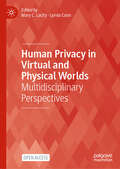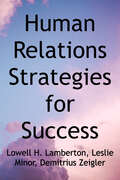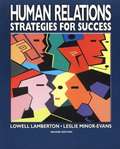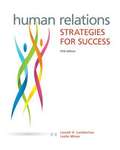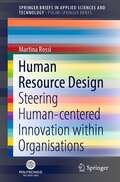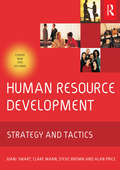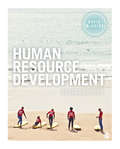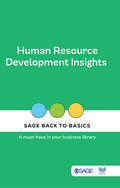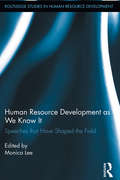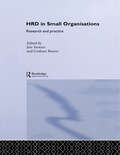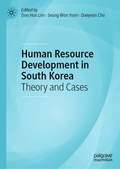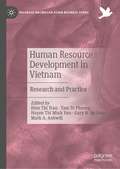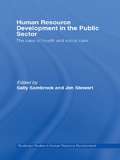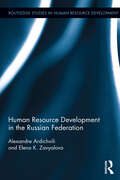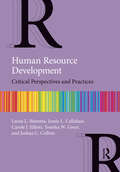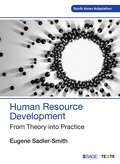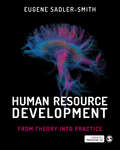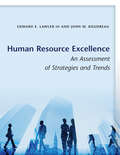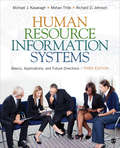- Table View
- List View
Human Privacy in Virtual and Physical Worlds: Multidisciplinary Perspectives (Technology, Work and Globalization)
by Mary C. Lacity Lynda CoonThis open-access book is premised on the belief that understanding and protecting privacy requires a multidisciplinary approach. The editors of this contributed book believe that privacy is a ‘wicked problem’ because of its social complexity. In the modern world, political, social, and technological structures increasingly violate human privacy in physical and virtual spaces. Our behaviors are surveilled, captured, and monetized—often without our knowledge. Contributors are experts from diverse fields, including anthropology, architecture, data science, engineering, history, information systems, library sciences, medicine, philosophy, and supply chain management, each writing for an explicitly interdisciplinary readership. Privacy as a concept is a moving target across the globe, morphing and transforming historically from one epoch to the next. By moving beyond the limitations of a single disciplinary lens, this book aims at a richer, more comprehensive, and more lasting analysis. This collection is of great interest to students and scholars of diverse backgrounds studying human privacy.
Human Relations
by Laura Portolese DiasHuman Relations by Laura Portolese-Dias addresses all of the critical topics to obtain career success as they relate to professional relationships. Knowing how to get along with others, resolve workplace conflict, manage relationships, communicate well, and make good decisions are all critical skills all students need to succeed in career and in life. Human Relations book isn't an organizational behavior text, but it provides a good baseline of issues students will deal with in their careers on a day-to-day basis. This book is also not a professional communications book, business English, or professionalism book, as the focus is much broader--on general career success and how to effectively maneuver in the workplace.
Human Relations: Strategies for Success
by Lowell H. Lamberton Leslie Minor Demitrius ZeiglerThis book will help you prepare for this changing world. This text covers time-tested, research-based social science and management principles, as well as newer theories and philosophies of human relations drawn from management theory, group theory, personality theory, and relationship theory. More than ever, effective relations skills are crucial to business success as organizations grow and compete in a global business environment. Employees must have the knowledge and skill to adapt to a workplace where change is frequent and inevitable.
Human Relations: Strategies for Success
by Lowell H. Lamberton Leslie Minor-EvansWe believe strongly in the importance of understanding the relationship between self-esteem and human relations.
Human Relations: Strategies for Success (Fifth Edition)
by Leslie Minor-Evans Lowell LambertonHuman Relations: Strategies for Success 5e by Lowell Lamberton and Leslie Minor will help you prepare for this changing world. This text covers time-tested, research-based social science and management principles, as well as newer theories and philosophies of human relations drawn from management theory, group theory, personality theory, and relationship theory. More than ever, effective human relations skills are crucial to business success as organizations grow and compete in a global business environment. Employees must have the knowledge and skill to adapt to a workplace where change is frequent and inevitable. Their commitment to the creation of a book that is at once interesting to read, motivating to study, and relevant to a wide variety has been the driving force behind Human Relations: Strategies for Success.
Human Resource Design: Steering Human-centered Innovation within Organisations (SpringerBriefs in Applied Sciences and Technology)
by Martina RossiThe book provides an understanding of how service design and design thinking could address the needs of organisations in tackling processes of transformations which include changes in the way people behave, interact and grow. It addresses the demand of human resource management functions, which are primarily called to manage such transformations about what regards people, namely the employees. It suggests a framework that defines a course of action, based on design features, aimed at supporting organisations in facing organisational change.The book will be of interest of researchers in the field of service design, design thinking and HR management, consultants/practitioners working in those fields, and educators that would like to train learners in becoming human resource designers.
Human Resource Development
by Alan Price Steve Brown Juani Swart Clare MannEach chapter in Human Resource Development provides the reader with commentary, activities and review sections in an integrated approach. The action-oriented approach is vital for practicing managers but increasingly for postgraduate and final year undergraduates who have work experience. It is this aspect of the book that fills a gap that currently exists in the market. This text reflects organizational realities and balances and integrates the coverage of individuals, teams and organizational learning.The book is written in a straightforward manner and explains concepts and key issues in a lucid style. The activities are focused and are better suited to encouraging readers to learn.
Human Resource Development
by David McGuireDavid McGuire's student-friendly introduction looks at Human Resource Development on an individual, organisational and societal level analysing how HRD can play a major role in organisational innovation, in developing communities and society and in operating on a cross-national and international basis. Key features: Links key training design and learning theories to broader economic and societal issues for a more holistic and in-depth understanding of the field. Seven brand new chapters ensure a good fit with HRD programmes at all levels and reflect the latest developments in the field, including career development, strategic HRD, knowledge management, the environment, ethics and CSR and the future of HRD. High profile case studies in each chapter bring the theory to life including Apple, Massive Open Online Courses, Barclays, Stephen Lawrence, Lloyds Pharmacy, Marriott Hotels, Netflix, Black and Decker, Google, Colgate-Palmolive, Marks and Spencer and Valve. Case vignettes throughout the chapters highlight HRD in action and provoke critical analysis and discussion, including How a Beer Can Aided the Design of Canon’s Revolutionary Mini-Copier and The Alaskan Village Set to Disappear Under Water in a Decade. An Appendix contains advice on preparing for an HRD examination as well as example exam questions and sample answers, to ensure examination success. Chapters map to the CIPD’s requirements at levels 5 and 7 making it an ideal core text for accredited and non-accredited programmes alike.
Human Resource Development
by David Mcguire Dr Kenneth Molbjerg JorgensenThe field of Human Resource Development has emerged as one of the most dynamic and multifaceted areas of business and management in recent years. Yet despite the mosaic of topics, debates and approaches, existing textbooks often overlook important emerging topics within the field, and do little justice to the variety of strands involved in the study of HRD. Human Resource Development: Theory and Practice encourages students and academics out of their comfort zones by offering the first comprehensive overview that encompasses all the constituent components of HRD, allowing the reader to clearly separate concepts within the field and provide a meaningful basis for detailed discussion and debate. This book serves as a comprehensive introductory text to the field of HRD, as well as an ideal platform for a more in-depth advanced study of the field. It is an invaluable resource for students of HRD, or any reader interested in how HRD can play a major role in oiling the gears of innovation within an organization.
Human Resource Development
by David McguireDavid McGuire's student-friendly introduction looks at Human Resource Development on an individual, organisational and societal level analysing how HRD can play a major role in organisational innovation, in developing communities and society and in operating on a cross-national and international basis. Key features: Links key training design and learning theories to broader economic and societal issues for a more holistic and in-depth understanding of the field. Seven brand new chapters ensure a good fit with HRD programmes at all levels and reflect the latest developments in the field, including career development, strategic HRD, knowledge management, the environment, ethics and CSR and the future of HRD. High profile case studies in each chapter bring the theory to life including Apple, Massive Open Online Courses, Barclays, Stephen Lawrence, Lloyds Pharmacy, Marriott Hotels, Netflix, Black and Decker, Google, Colgate-Palmolive, Marks and Spencer and Valve. Case vignettes throughout the chapters highlight HRD in action and provoke critical analysis and discussion, including How a Beer Can Aided the Design of Canon's Revolutionary Mini-Copier and The Alaskan Village Set to Disappear Under Water in a Decade. An Appendix contains advice on preparing for an HRD examination as well as example exam questions and sample answers, to ensure examination success. Chapters map to the CIPD's requirements at levels 5 and 7 making it an ideal core text for accredited and non-accredited programmes alike.
Human Resource Development Insights (SAGE Back to Basics)
by SAGE Publications India Pvt. LtdHR can transform organizations only if it transforms HR. Human Resource Development Insights is a pivotal source of information on implementing new ways to stimulate growth within an organization. Based on groundbreaking research, this book provides compelling theory and practical tools to create alignment between people, strategy and systems. Covering a range of topics such as recruitment, competency mapping, performance management, training and learning, and team effectiveness scale, the book is an ideal reference for HR practitioners seeking content on implementing new competencies in the workforce and achieving overall organizational development. SAGE Back to Basics is a distilled compilation of proven and timeless ideas and best practices for new-age and experienced leaders alike. The hand-picked collection of books—on management, leadership, entrepreneurship, branding and CSR—offer advice from management experts whose knowledge and research has impacted and shaped business and management education. Other books in the series: Timeless Leadership | Advertising and Branding Basics | Leadership Lessons from Dr Pritam Singh | Corporate Social Responsibility in India | Basics of Entrepreneurship | Ideate, Brainstorm, Create | Building Professional Competencies | Timeless Management | Soft Skills for Workplace Success
Human Resource Development as We Know It: Speeches that Have Shaped the Field (Routledge Studies in Human Resource Development)
by Monica LeeThe field of Human Resource Development has developed largely through academics, scholars and reflective practitioners from across the world coming together. Many people link memorable keynote speeches to changes in their research, practice, career path or even life view. Good keynote speeches are a forthright statement of the expert’s view and thus are often not published. Now that HRD is maturing there is a need to recapture some of those earlier moments – both as a form of archive, and also to shed light on the path that has been followed. Twenty-two speeches seminal to the field of HRD are included in this volume. These speeches are milestones along the path of the development of the field; as well as reconstructing their speech, the contributors have also located it within the time it was given and commented on how the field has developed since. This book is a resource, not only as an archive and for those who wish to relive their pivotal moments, but also for anyone interested in the development of HRD as a discipline. This unique approach provides an exciting and engaging way to reflect on cutting edge issues in the academic and practitioner world of HRD!
Human Resource Development in Small Organisations: Research and Practice
by Jim Stewart Graham BeaverIn its description and analysis of the current context of research and practice of HRD in small organizations, this collection of essays provides a comprehensive and critical evaluation of current approaches. This evaluation leads to an exploration of a number and range of HRD methods as they are applied in the small organization context and provid
Human Resource Development in South Korea: Theory and Cases
by Doo Hun Lim Seung Won Yoon Daeyeon ChoThis edited book covers major trends, notable distinctions, and the challenges and needs for preparing future HRD activities in South Korea. It consists of three major sections: national and social issues of HRD, sector perspectives on HRD, and contemporary issues and trends. To cover contemporary trends and future issues, authors examine topics in diverse areas, such as the application of data analytics for HRD, action learning trends, and psychological and work climate issues affecting performance. Through theory and cases, this book will show how HRD can be successful at the organizational, industrial, and societal levels as well as the future needs required to further advance HRD in the nation.
Human Resource Development in Vietnam: Research and Practice (Palgrave Macmillan Asian Business Series)
by Mark A. Ashwill Gary N. McLean Hien Thi Tran Tam To Phuong Huyen Thi Minh VanDespite recent high GDP growth rates, Vietnam remains a developing country in need of developing human resources (HR) of both genders. This can be done through education, workplace training, corporate social responsibility, policies for gender equality, support for entrepreneurship, and other practices and policies. Yet, national human resource development (NHRD) is a relatively new concept in Vietnam. This edited volume highlights the importance of HR, HRD, and NHRD, enabling Vietnam to experience sustainable growth and become a modern industrial country. It examines the positive changes effected by HRD considering Vietnam’s unique historical, political, economic, and cultural contexts. This book offers scholars and practitioners an indigenous HRD approach and discusses implications for future research and practices.
Human Resource Development in the Public Sector: The Case of Health and Social Care (Routledge Studies in Human Resource Development)
by Jim Stewart Sally SambrookAcross Europe and the world, countries are attempting to develop their health and social policies and practices to address the global challenge of increasing demand and pressurized supply, created by ageing populations, emerging technologies and finite resources (financial and human). This text provides examples of attempts to develop HRD practices in health and social care contexts within France, Ireland, The Netherlands, Romania, Russia, the UK and the USA. Thus, the book is European and international in both scope and appeal.
Human Resource Development in the Russian Federation (Routledge Studies in Human Resource Development)
by Alexandre Ardichvili Elena ZavyalovaUnlike Brazil, India, or China, prior to the beginning of market-oriented reforms in early 1990s, Russia maintained a high level of human capital and possessed a highly developed system of vocational education, continuous education, and management development institutions sponsored by the government. However, after the beginning of the market reforms many state-sponsored programs were disbanded and individual enterprises and newly emerging private educational institutions found themselves in a position of having to provide training and professional development services for future and current employees. Both government-level policies in support of HRD and enterprise-level HRD systems have emerged fairly recently in the Russian Federation, and are still in a stage of change and development. This book provides an in-depth analysis of the current state of HRD in the Russian Federation. It covers country-level policies, organizational-level programs and strategies, and individual-level educational and training efforts. While the study is focused on Russia, its conclusions will be of value to scholars, students, and practitioners examining similar issues surrounding the emergence and development of HRD systems in emerging countries. Furthermore, the authors’ framework for analyzing HRD on multiple levels and across various parts of the adult and vocational education and development systems offers a unique and important contribution to the theoretical debate on comparative educational systems outside the HRD and HRM communities.
Human Resource Development: Critical Perspectives and Practices
by Laura L. Bierema Joshua C. Collins Jamie L. Callahan Carole J. Elliott Tomika W. GreerHuman Resource Development: Critical Perspectives and Practices is a landmark textbook on HRD scholarship and practice and is a significant departure from the standard HRD texts available. Based on Bierema and Callahan’s framework for critical human resource development, this book develops an understanding of HRD that addresses both key and contested issues of practice associated with relating, learning, changing, and organizing for organizations. This book covers the basic tenets of HRD, interrogates the dominant paradigms and practices of the field, teaches readers how to critically assess HRD practices and outcomes, and provides critical alternatives. The text also addresses HRD as a contested field and the importance for HRD professionals to reflect on their values, maintain their sanity, and retain their employment while attempting to do this difficult work that serves multiple stakeholders. The text weaves in Points to Ponder, Case in Point, and Tips & Tools features and exercises, giving readers an insight into HRD issues across the globe. This critical text offers an exciting alternative to the instrumentalist, managerialist, and masculine perspective of other books. Designed for students and practitioners, this textbook will be essential reading for upper-level courses on human resource development, human resource management, and adult education.
Human Resource Development: From Theory into Practice
by Eugene Sadler-SmithAn immersive textbook that offers readers a comprehensive and detailed introduction to HRD that is theory-based, evidence-driven and practically oriented This textbook combines theoretical rigour and pedagogical innovation to give students and teachers alike an accessible guide to human resource development and its fundamental theories and practices. The book reflects the author's firm belief that learning offers the best competitive advantage and is thus designed to train students interested in HRD into industry-ready professionals. Human Resource Development will guide its readers on how to maximize employees' potential using systematic and systemic approaches to drive individual and organizational performance. Key Features: • Analytical approach to the subject with a checklist framework in each chapter that presents the contents systematically • Follows a unique framework based on the distinction between 'micro-HRD', which zooms-in on the fine details, and 'macro-HRD', which zooms-out to look at the bigger picture • Includes a rich array of research insights, case studies and examples from a wide range of contexts • Covers cutting-edge topics such as e-learning, 'hybrid learning', neuroscience and learning, 'learning ecosystems', and the 'new learning organization' science of learning
Human Resource Development: From Theory into Practice
by Eugene Sadler-SmithCombining theoretical rigor, practical relevance and pedagogical innovation, Human Resource Development: From Theory into Practice is an essential resource for students working towards a career in human resource development (HRD), human resource management (HRM), occupational and organizational psychology, and related areas of business management and organization. Key features: • Aligns with the CIPD Professional Standards and the CIPD’s Level 7 Diploma in Learning and Development. • Covers all the basics in the fundamentals of HRD theory and practice, as well as cutting-edge topics such as the e-learning, ‘hybrid learning’, neuroscience and learning, ‘learning ecosystems’, and the ‘new learning organization’ science of learning. • Follows a unique framework based on the a distinction between ‘micro-HRD’, which zooms-in on the fine detail, meso, and ‘macro-HRD’, which zooms-out to look at the bigger picture. • Includes a rich array of research insights, case studies and examples from a wide range of contexts. • Offers a variety of learning features, including ‘perspectives from practice’ and ‘in their own words’, which help to bridge the gap between theory and practical application. This up-to-date and authoritative textbook is accompanied by a comprehensive instructor’s manual and PowerPoint slides to support lecturers in their teaching.
Human Resource Development: From Theory into Practice
by Eugene Sadler-SmithCombining theoretical rigor, practical relevance and pedagogical innovation, Human Resource Development: From Theory into Practice is an essential resource for students working towards a career in human resource development (HRD), human resource management (HRM), occupational and organizational psychology, and related areas of business management and organization. Key features: • Aligns with the CIPD Professional Standards and the CIPD’s Level 7 Diploma in Learning and Development. • Covers all the basics in the fundamentals of HRD theory and practice, as well as cutting-edge topics such as the e-learning, ‘hybrid learning’, neuroscience and learning, ‘learning ecosystems’, and the ‘new learning organization’ science of learning. • Follows a unique framework based on the a distinction between ‘micro-HRD’, which zooms-in on the fine detail, meso, and ‘macro-HRD’, which zooms-out to look at the bigger picture. • Includes a rich array of research insights, case studies and examples from a wide range of contexts. • Offers a variety of learning features, including ‘perspectives from practice’ and ‘in their own words’, which help to bridge the gap between theory and practical application. This up-to-date and authoritative textbook is accompanied by a comprehensive instructor’s manual and PowerPoint slides to support lecturers in their teaching.
Human Resource Development: From Theory into Practice
by Eugene Sadler-SmithCombining theoretical rigor, practical relevance and pedagogical innovation, Human Resource Development: From Theory into Practice is an essential resource for students working towards a career in human resource development (HRD), human resource management (HRM), occupational and organizational psychology, and related areas of business management and organization. Key features: • Aligns with the CIPD Professional Standards and the CIPD’s Level 7 Diploma in Learning and Development. • Covers all the basics in the fundamentals of HRD theory and practice, as well as cutting-edge topics such as the e-learning, ‘hybrid learning’, neuroscience and learning, ‘learning ecosystems’, and the ‘new learning organization’ science of learning. • Follows a unique framework based on the a distinction between ‘micro-HRD’, which zooms-in on the fine detail, meso, and ‘macro-HRD’, which zooms-out to look at the bigger picture. • Includes a rich array of research insights, case studies and examples from a wide range of contexts. • Offers a variety of learning features, including ‘perspectives from practice’ and ‘in their own words’, which help to bridge the gap between theory and practical application. This up-to-date and authoritative textbook is accompanied by a comprehensive instructor’s manual and PowerPoint slides to support lecturers in their teaching.
Human Resource Development: Talent Development (Seventh Edition)
by Jon M. WernerHUMAN RESOURCE DEVELOPMENT is a comprehensive text for undergraduate and graduate courses that prepare students to train and develop people. As such, the book covers the entire field of HRD (as defined by the American Society for Training and Development's competency study), from orientation and skills training, to career and organizational development. HUMAN RESOURCE DEVELOPMENT provides a clear understanding of the concepts, processes, and practices that form the basis of success and shows how concepts and theory can and have been put into practice in a variety of organizations. This textbook focuses on the shared role of line management and human resource specialists in HRD and also reflects the current state of the field, blending real-world practices with up-to-date research.
Human Resource Excellence: An Assessment of Strategies and Trends
by Edward E. Lawler III John W. BoudreauAs a field, human resources has been slow to evolve, despite a great need and opportunity for change. Human Resource Excellence delivers the newest findings about what makes HR successful and how it can add value to today's organizations. Tracing changes in a global sample of firms across the US, Europe, and Asia, this landmark volume provides an international benchmark against which to measure a company's HR practice. For over twenty years, USC's Center for Effective Organizations has conducted the definitive longitudinal study of the human resource management function. Analyzing new data every three years, the Center charts changes in HR and offers guidance on how human resource professionals can drive firm performance. In this latest survey, Edward E. Lawler III and John W. Boudreau conclude that HR is most powerful when it plays a strategic role, makes use of information technology, and has tangible metrics and analytics. Their insights offer an essential understanding of HR's changing role in strategy, big data, social and knowledge networks, and the gig economy.
Human Resource Information Systems: Basics, Applications, and Future Directions
by Dr Michael J. Kavanagh Mohan Thite Dr Richard D. JohnsonHuman Resource Information Systems: Basics, Applications, and Future Directions, Third Edition is a cross-disciplinary book that provides a thorough introduction to the field of Human Resource Information Systems (HRIS), a combination of two major management fields that impact the competitive advantage of companies—human resources and information systems. Unlike other HRIS textbooks that overwhelm students with technical info and jargon, Michael J. Kavanagh and Richard D. Johnson offer a balanced approach in dealing with HR and IT/IS issues by drawing from experts in both areas.
